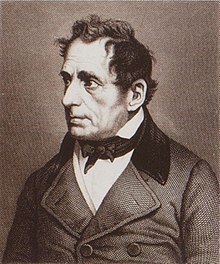Albert Schott (lawyer)
Albert Christian Friedrich Schott (born April 30, 1782 in Sindelfingen ; † June 6, 1861 in Stuttgart ) was a Württemberg lawyer and politician.
Life
Schott came from a Protestant family. From 1799 to 1804 he studied philosophy and law at the University of Tübingen and the University of Landshut . After his doctorate as Dr. iur. he went on a study trip to France , where he joined the Grand Lodge of the Grand Orient de France in Paris . Back at home, he began a legal career as a lawyer in the Württemberg judicial service. In 1805 he was appointed court attorney and state commissioner in Stuttgart and also appointed imperial notary . From 1815 to 1817 he worked as secretary and registrar of the Estates Assembly. After being removed from office in 1817 and subsequently reinstated, Schott became procurator at the upper tribunal in 1818 . In 1819 he became a member of the Estates Assembly, from 1820 to 1823 and 1833 to 1838 he was a leading liberal opposition member of the Second Chamber of the Württemberg state parliament .
At the same time, Schott was committed to the Württemberg singing system, including as the founder of the Stuttgarter Liederkranz . In 1847 he became a member of the honorary council of the Deutsche Zeitung .
As part of the March Revolution , Schott took part in the pre-parliament in 1848 and then became secretary of the Fifties Committee . From May 18, 1848 until the end of the rump parliament on June 18, 1849, Schott represented the 3rd Neckar District in Böblingen as a member of the Frankfurt National Assembly , where he first belonged to the left-wing Deutscher Hof faction and later to the less radical Westendhall faction . In the National Assembly, Schott was the senior president and deputy chairman of the finance committee.
In 1850 he took part in the second and third constituent assemblies in Württemberg. In 1859 Schott became an honorary member of the Swabian Singers' Association .
Among his sons were the folklorist Albert Schott , the naturalist Arthur Carl Victor Schott and the lawyer Sigmund Schott . In 1905 Schottstraße in Stuttgart-Nord was named after Albert Schott and his son Sigmund Schott. His grandson was the Benedictine priest and Catholic theologian Anselm Schott .
literature
- Eugen Schneider : Schott, Albert (lawyer) . In: Allgemeine Deutsche Biographie (ADB). Volume 32, Duncker & Humblot, Leipzig 1891, pp. 395-397.
- Heinrich Best, Wilhelm Weege: Biographical manual of the members of the Frankfurt National Assembly 1848/49 . Düsseldorf: Droste-Verlag, 1998. (pp. 303f.), ISBN 3-7700-0919-3
- Frank Raberg : Biographical handbook of the Württemberg state parliament members 1815-1933 . On behalf of the Commission for Historical Regional Studies in Baden-Württemberg. Kohlhammer, Stuttgart 2001, ISBN 3-17-016604-2 , p. 829 .
Individual evidence
- ^ Heinrich Best, Wilhelm Weege: Biographical Handbook of the Members of the Frankfurt National Assembly 1848/49 . Droste, 1998, ISBN 978-3-7700-0919-0 ( google.co.uk [accessed September 4, 2018]).
| personal data | |
|---|---|
| SURNAME | Schott, Albert |
| ALTERNATIVE NAMES | Schott, Albert Christian Friedrich (full name) |
| BRIEF DESCRIPTION | Württemberg lawyer and politician |
| DATE OF BIRTH | April 30, 1782 |
| PLACE OF BIRTH | Sindelfingen |
| DATE OF DEATH | June 6, 1861 |
| Place of death | Stuttgart |

